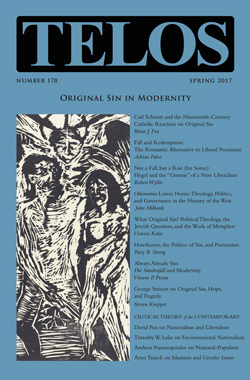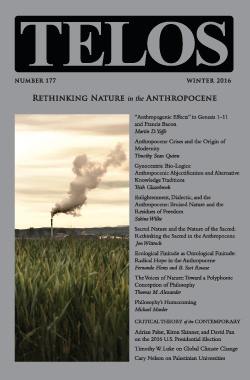By Mark Wegierski · Thursday, October 26, 2017 The following paper was presented at the conference “After the End of Revolution: Constitutional Order amid the Crisis of Democracy,” co-organized by the Telos-Paul Piccone Institute and the National Research University Higher School of Economics, September 1–2, 2017, Moscow. For additional details about the conference as well as other upcoming events, please visit the Telos-Paul Piccone Institute website.
This presentation compares two societies, which, although both claim to be “Western” as well as vibrant liberal democracies, are in many aspects quite different. Those societies have been shaped by their history and political culture to evolve in quite different directions. Nevertheless, they can both be seen as “post-revolutionary” societies.
Poland has had a very checkered history, from being a Great Power, to disappearing from the map of Europe, which has contributed to a strongly “erotic” sense of belonging among the Poles. Poland after 1989—the so-called Third Republic—has been in the difficult process of attempting a restoration of a more traditional Polish society, whose organic evolution and development had been so cruelly interrupted since 1939.
Continue reading →
By Aleksandr Shchipkov · Monday, October 2, 2017 The following paper was presented at the conference “After the End of Revolution: Constitutional Order amid the Crisis of Democracy,” co-organized by the Telos-Paul Piccone Institute and the National Research University Higher School of Economics, September 1–2, 2017, Moscow. For additional details about the conference as well as other upcoming events, please visit the Telos-Paul Piccone Institute website.
Today is the time when we get to discuss our future together. This is a rare occasion that may or may not occur every hundred years. For once, we now have Russians, Americans, and Europeans sitting in one boat and considering together how to pass the rapids without capsizing. Steering out of the impasse where we have been driven by the global crisis requires clear thinking and direct, candid dialogue, i.e., the return to the “direct statement” culture. And this is exactly the way in which I will take the liberty to speak. I term the manner of speaking plainly in scientific discussions as “intellectual diplomacy.” And there are times when it is capable of achieving greater results than the combined efforts of the foreign ministries of a number of countries of the world.
Continue reading →
By Russell A. Berman · Monday, April 3, 2017 In addition to its main focus on original sin in modernity, Telos 178 (Spring 2017) features a special section of topical writing, introduced here by Russell A. Berman, that continues our ongoing commitment to setting forth a critical theory of the contemporary. Telos 178 is now available for purchase in our store.
 Not that long ago, debates over politics were anchored in a clear opposition between universalism and relativism. Proponents of an inclusive structure of, at least aspirationally, all states—the new world order—envisioned an unchallenged entrenchment of democratic capitalism everywhere. Where dictatorships endured, as in North Korea, they were treated as bizarre outliers, exceptions that proved the rule of the progress of mankind toward Kant’s perpetual peace. Universalist values held sway; ultimately all rights were to become human rights, due to all humans solely on the basis of their humanity, implying that rights pursuant to national citizenship, to membership in any particular national community, would dwindle in significance: no borders, no sovereignty, no traditions. However this conceptual expression of globalization faced sophisticated critics, variously postmodern, which treated that universalism with disdain and suspicion, insinuating to it an imperial agenda and offering an alternative program of multiplicity, diversity, and multipolarity. That was the historical moment of the theoretical opposition between Habermas and Derrida, the universality of communicative reason versus the insistence on difference. Inclusion and integration stood opposed to multiculturalism, as did generally applicable norms to the particular claims of local culture and tradition. Not that long ago, debates over politics were anchored in a clear opposition between universalism and relativism. Proponents of an inclusive structure of, at least aspirationally, all states—the new world order—envisioned an unchallenged entrenchment of democratic capitalism everywhere. Where dictatorships endured, as in North Korea, they were treated as bizarre outliers, exceptions that proved the rule of the progress of mankind toward Kant’s perpetual peace. Universalist values held sway; ultimately all rights were to become human rights, due to all humans solely on the basis of their humanity, implying that rights pursuant to national citizenship, to membership in any particular national community, would dwindle in significance: no borders, no sovereignty, no traditions. However this conceptual expression of globalization faced sophisticated critics, variously postmodern, which treated that universalism with disdain and suspicion, insinuating to it an imperial agenda and offering an alternative program of multiplicity, diversity, and multipolarity. That was the historical moment of the theoretical opposition between Habermas and Derrida, the universality of communicative reason versus the insistence on difference. Inclusion and integration stood opposed to multiculturalism, as did generally applicable norms to the particular claims of local culture and tradition.
Continue reading →
By Telos Press · Friday, February 10, 2017 Constitutional Theory as Cultural Problem:
Global Perspectives
January 19–21, 2018
New York, NY
The International Center for Critical Theory and the Telos-Paul Piccone Institute will jointly host a conference entitled “Constitutional Theory as Cultural Problem: Global Perspectives,” to be held at New York University, New York, from January 19–21, 2018.
The challenges faced by the liberal democratic model in the 21st century have made constitutional theory into an urgent topic of global concern. Both the second Iraq War and the revolutions of the Arab Spring frustrated hopes of an easy trajectory toward liberal democratic constitutional orders. If there was the hope that liberation would mean the establishment of liberal democracy, the result has been that emancipation from tyranny does not naturally lead in a particular political direction. Such a conclusion presents fundamental problems for a constitutional theory that is built around a liberal democratic model.
Continue reading →
By Lukas Szrot · Tuesday, February 7, 2017 During his 2004 presidential campaign, John Kerry stated, “We have to get back to the place we were, where terrorists are not the focus of our lives, but they’re a nuisance.” Though this statement was widely lampooned on right-leaning American media outlets, it is worth examining: swimming pools, and choking on one’s food, are more deadly, all things being equal, than terrorism. Yet terrorism produces a “conceptual helplessness,” in which, “We seem to be left with no good choices. To call what happened on September 11 evil appeared to join forces with those whose simple, demonic conceptions of evil often deliberately obscure more insidious forms of it. Not to call the murders evil appeared to relativize them, to engage in forms of calculation that make them understandable—and risked a first step toward making them justifiable.”
Continue reading →
By Russell A. Berman · Wednesday, December 21, 2016 In addition to its main focus on nature and the Anthropocene, Telos 177 (Winter 2016) features a special section of topical writing, introduced here by Russell A. Berman, that continues our ongoing commitment to setting forth a critical theory of the contemporary. Telos 177 is now available for purchase in our store.
 After a rancorous and ugly presidential campaign, in which vitriol and name-calling replaced discussion and policy, one moment stands out for its dignity: President Obama’s grace and generosity when he welcomed the president-elect to the White House. Above the fray and with a Lincolnian refusal of malice, he modeled a possibility of reconciliation and healing, as if citizens might genuinely respect each other, despite profound differences. That utopia will likely remain elusive, but the president’s bearing provides a lesson in civic virtue. Democracy can be coarse. He showed how it can be better. That legacy will be important. After a rancorous and ugly presidential campaign, in which vitriol and name-calling replaced discussion and policy, one moment stands out for its dignity: President Obama’s grace and generosity when he welcomed the president-elect to the White House. Above the fray and with a Lincolnian refusal of malice, he modeled a possibility of reconciliation and healing, as if citizens might genuinely respect each other, despite profound differences. That utopia will likely remain elusive, but the president’s bearing provides a lesson in civic virtue. Democracy can be coarse. He showed how it can be better. That legacy will be important.
Continue reading →
|
|




